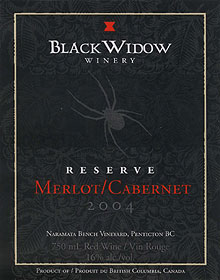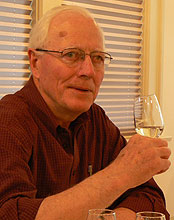

Black Widow Winery
2004 Merlot-Cabernet, Naramata Bench Vineyard(Okanagan Valley)
One of the newest wineries in the Okanagan, Black Widow culminates a journey that Dick Lancaster began 25 years when he started making wines at home. He might have remained a happy home vintner except that, in 2000, he and his wife Shona went looking for a country retreat and were persuaded to buy a seven-acre vineyard on the Naramata Bench. Until recently, Lancaster sold most of his grapes to other wineries.
Only 53, he has also kept his day job as chief financial officer of an industrial minerals company. At the same time, contractors completed a brand new gravity flow winery on the Black Widow property in time for the 2006 crush. The winery is getting ready to release its first wines, all of them in small volumes.
Only 60 cases of this reserve red are being released. It is a huge, ripe red with 16% alcohol but with so much fruit that the alcohol does not bite. Lancaster fermented the two component varietals separately, evaluating them before putting together the blend. He deliberately kept fermentation temperatures in the cool range of 21C-24C in order to preserve bright fruit flavours. The wine has been aged in French oak for 21 months. It was then fined with egg whites to soften the tannins because, Lancaster reasons, “most people buy wine to drink now.” The wine has a vibrant ruby hue, with richly concentrated textures and bright flavours of currants and blackberries. 88 points.
Reviewed October 23, 2006 by John Schreiner.
Other reviewed wines from Black Widow Winery
|
Black Widow Winery 2005 Merlot-Cabernet, Naramata Bench Vineyard (Okanagan Valley)John Schreiner 10/20/2007 |
The Wine
Winery: Black Widow Winery |
The Reviewer John Schreiner
John Schreiner
John Schreiner has been covering the wines of British Columbia for the past 30 years and has written 10 books on the wines of Canada and BC. He has judged at major competitions and is currently a panel member for the Lieutenant Governor’s Awards of Excellence in Wine. Both as a judge and as a wine critic, he approaches each wine not to find fault, but to find excellence. That he now finds the latter more often than the former testifies to the dramatic improvement shown by BC winemaking in the past decade. |










